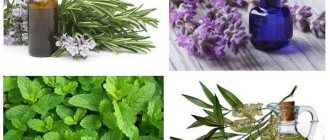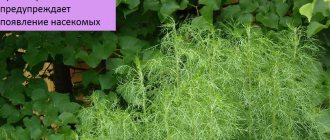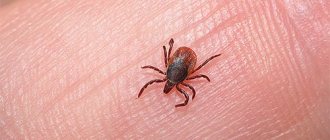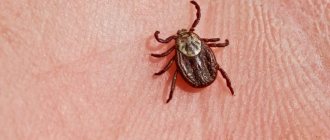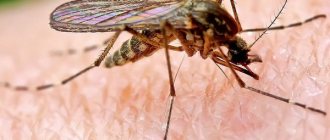The effectiveness of essential oils against ticks
The substances that make up industrial protective equipment can pose a threat not only to parasites, but also to people. In the production of aerosols, sprays, and creams, neurotoxins (DEET) and other hazardous substances are used. Components of store-bought drugs can provoke individual reactions and have many contraindications. Medicines and their packaging pollute the environment.
Vegetable essential oils against ticks are non-toxic for humans, practically do not cause allergies, and can be used for children and pets. These are natural remedies that do not harm nature. Parasites will be afraid of scents and will not attack their carriers.
Lavender oil
This oil perfectly protects the human body not only from ticks, but also from other annoying insects. It helps control wasps and mosquitoes.
Lavender oil is an excellent disinfectant that can help fight infection. It is often added to face and hair masks. It has a very pleasant aroma and stimulates blood circulation in the body.
There are two ways to use it to combat ticks.
- Apply to exposed areas of the body. Before heading out into nature, treat your arms, neck and legs with lavender oil.
- Using an aroma lamp. This attribute will not take up much space in your hiking bag. Ticks hate the smell of lavender, so light a lamp and pour a few drops of lavender oil into a special container. When it evaporates, it will emit a smell that will prevent various insects from approaching you.
List of effective oils against ticks
Humanity has long used aromatic extracts from plants; their properties and composition are studied by modern science. Some protect against ticks in the best possible way, while others, on the contrary, have almost no effect on them.
There are plants whose odors provide the most effective protection against bites. All of them can be used individually or in combinations that increase their effectiveness.
Cat mint
This plant of the Lamiaceae family is also called catnip. The ether content in its leaves and stems reaches 3%, and in the seeds – up to 27%. The main component is nepectolone, in addition to it there is ascorbic acid, tannins, and glycosides. The smell of catnip is very attractive to cats and is hated by ticks.
Citronella
The smell of Java citronella is similar to that of lemon, so another name for the plant is lemon balm, or lemon grass. The aroma of citronella, in addition to citrus, is filled with notes of freshly cut grass.
Lemon eucalyptus
Repels arachnids with a guarantee. The aroma of this plant is similar to the smells of verbena, lemon, thyme, and lemon balm. In addition to active protection against bloodsuckers, it has an antiseptic effect and helps heal wounds. The plant itself is native to tropical Australia and is now often grown as a home plant.
Thyme
Fragrant thyme, or thyme, can often be found in a country house or flower bed. It's beautiful and smells nice. Thyme herbs and seeds are used in the preparation of various dishes, and the essential extract has been used in aromatherapy since ancient Egypt. Its deep spicy woody-herbaceous aroma is not to the liking of insects and arachnids.
Carnation
Spice, dried flower buds of the clove tree, growing in tropical regions. Clove essential oil is an unparalleled antiseptic. It is actively used in folk medicine and cosmetology. It heals wounds, relieves coughs, and relieves pain. It is strictly forbidden to use it in its pure form, as there is a high risk of burning the skin or mucous membranes.
Tea tree
The features of this ether have been fully explored only recently. It has antibacterial, antiviral, wound healing, anti-inflammatory effects. At the same time, the product does not damage healthy skin, is not an irritant, and is hypoallergenic.
Geranium and lavender
Geranium essential oil is very light, transparent, bright green in color, with a fruity base and bitter notes. The aroma of lavender is calming and relaxing. In addition to perfume, it also has antiparasitic uses.
Ticks really do not like the smells of geranium and lavender oils and avoid places with these plantings.
Neem essential oil
This ester is a natural pesticide obtained from the seeds of the neem tree. Yellow-brown in color, bitter in taste, its aroma is a mixture of sulfur and garlic. It is an excellent substitute for chemicals and can easily deal with ticks. Unlike others that simply repel parasites, neem extract kills those that do not have time to crawl away.
Cedar
Cedar oil is obtained from the bark and young branches of different types of cedar using steam distillation. Viscous, amber in color, with the smell of resin, smoke and wood, it does not allow ticks and blood-sucking insects to approach humans. Not recommended for use if your child is under 12 years old.
Other
In order to repel ticks, other esters are used: anise, fir, juniper, rosemary.
Separately, it is worth noting eucalyptus oil against ticks. This remedy is considered one of the most effective in the fight against parasites. It has the properties of a pesticide, so it will not only repel parasites with its smell, but will quickly weaken or destroy a tick that gets on the skin or clothing.
Using essential oils against ticks
Method No. 1
Take 2 tablespoons of base oil, mix it with 15-25 drops of geranium or palmarosa oil. The resulting liquid is applied to clothing and exposed skin. The only contraindication: if you are allergic to the strong aroma of flowers, then it is better not to use this method. The odorous effect will immediately make itself felt: for humans the aroma is very pleasant, but for ticks it is repellent. Even after actively using the product, you must carefully check your clothes for ticks. Any walk in the forest or park is advisable to use this substance against insects. It is better to protect yourself immediately than to expose yourself to danger.
Advantages of the first recipe:
- effectiveness after applying the resulting liquid;
- a cheap way to protect yourself from ticks;
- liquid storage lasts up to six months;
- minimum preparation time, maximum action;
- the effect lasts for 24 hours.
Disadvantages of the recipe
- keep liquid away from eyes;
- cannot be used on animals;
- The product is not suitable for those who have allergies.
Method No. 2
To prepare an anti-tick spray, take 2 teaspoons of geranium or palmarosa essential oil and mix it with 200 ml of regular filtered water. Pour in a little of any emulsifier (you can use alcohol). All contents should be in a spray bottle to make it easier to spray the liquid onto clothes and skin. The only contraindication: allergies. It is necessary to apply the spray if you decide to work in the country or relax in nature. It’s better to be protected than to be bitten by a blood-sucking parasite.
Advantages of the second recipe:
- a very effective remedy, since geranium is the best tick repeller;
- maximum effect after use;
- the best cheap way to protect yourself from parasites;
- The aroma from the spray not only repels ticks, but also has a destructive effect on them.
Disadvantages of the recipe:
- For those with allergies, the product will not help;
- keep away from animals and children.
Specific clove oil
Another equally effective oil is made from cloves. It is quite rare, but if you catch your eye, you should take it without hesitation. Mode of application:
- Mix 2 teaspoons of clove oil with plain water.
- Add a little alcohol to the contents.
- Mix everything in a separate bottle, attaching a spray bottle.
This product can be easily sprayed not only on clothes and skin, but also on plants and animals. The product is perfectly used not only outdoors, but also at home. It can be used to spray bedding and pets' sleeping areas. This is a very convenient substance, literally universal, as it helps not only humans, but also animals. There are no disadvantages to clove oil; there are only advantages.
In any case, the effectiveness of protection will always depend on the quality of the prepared anti-tick product. Also, you should carefully read the composition of each essential oil, do not buy a fake. It’s better to let it be natural essential oil. Try to stay less near the forest, where there are a huge number of hungry insects that are just dying to bite you. You should not resort to chemicals, as it is possible to try traditional methods to combat ticks first. And, if absolutely nothing can help, only in these cases you need to turn to more toxic repellents. But the fact that essential oils will help is one hundred percent certain.
How to make a tick repellent from essential oil at home?
There are several ways to protect yourself from attacks:
Application to skin
Essential oil must be diluted with vegetable oil. Add 20-30 drops of the product to 1 tablespoon of any vegetable oil and mix.
This way:
- safe;
- effective;
- available;
- easy to use;
- the mixture can be stored for up to 6 months.
Water based aerosol
You can make your own anti-tick spray at home. Using a sprayer, the aroma is applied to the skin and clothes without the risk of greasy stains.
Ingredients:
- Aroma oil – 30-40 drops;
- Apple (wine) vinegar or 40% solution of medical alcohol – 60 ml;
- Purified water – 60 ml;
- Glycerin – ½ teaspoon. It will make the aroma more persistent; it is not necessary to add it.
Cooking instructions:
- Pre-mix the oil with vodka or vinegar, since it does not mix with water.
- Add the mixture to the water, shake thoroughly to combine all ingredients.
- It is better to store the product in a spray bottle with a bottle made of glass or PET plastic. Other materials may be damaged by the spray composition.
The aerosol is applied 20 minutes before going out into nature, treating exposed areas of the body, clothes, shoes, and hats.
An alternative method is used when there is no desire to apply the product to clothing or skin. Make a protective “talisman” against ticks by soaking a wooden or leather item in oils.
The scents are effective against mosquitoes and other insects. Flies, ants, and bedbugs are afraid of strong odors. Apply drops of extracts to cotton pads and spread around the apartment. This will protect your home from uninvited guests, freshening the air.
Oil burner
The method is effective in a house or gazebo. A few drops of aromatic oils will repel ticks and insects and fill the air with pleasant odors.
Features of use for children
Babies and older children will be protected by essential oils with calm odors that do not cause allergies. These are aromas of eucalyptus and lavender. Before use, be sure to test for individual reaction.
Advice! To avoid allergic reactions, apply the product not to the skin, but to clothing, shoes, hats, and strollers.
Recipes for preparing tick repellents
In order to prepare a folk remedy for ticks, you need to use one of the listed essential oils, as well as other additional components that will not only provide maximum protection against parasites, but also provide aromatherapy.
What don't ticks like? Alcohol or vinegar - strong odors that repel insects, enhance the effect of sprays, but please note that these components are only suitable for adults.
Alcohol spray includes the following components:
- glass of water;
- two tablespoons of alcohol;
- two tablespoons of geranium oil.
Pour the ingredients into the bottle and shake well, store in a cool place and use as needed. The shelf life is about six months; it can be applied to skin and clothing using a spray bottle.
The dangerous insect cannot tolerate the ant smell, so while walking in the forest you should spray your shoes and outerwear with the product. To prepare tick poison, you will need formic alcohol - 200 ml, water - 200 ml and any essential oil as desired. Mix the ingredients and place in a spray bottle. Use outdoors every three hours.
Another effective remedy against parasites contains vinegar and other additional components:
- 4 tablespoons of vinegar;
- 2 tablespoons of water;
- eucalyptus or mint ether – 15 drops.
Pour the components into the bottle and shake well, store in the refrigerator for no longer than six months. The product can be applied to both clothing and skin.
Valerian. Ticks don't like its smell. Recipe for application to skin or protective clothing:
- cologne or alcohol - one spoon;
- valerian drops – 10 drops.
Mix the ingredients and pour into a resealable bottle; you can store for no more than 6 months. To apply the elixir to the skin, use a cotton sponge.
To prepare a spray that can be taken outdoors, you need to use tar soap, citrus esters and water - this composition is allowed to be used to protect animals and children. To prepare you will need:
- tar soap;
- oil of myrrh, juniper, oregano, thyme and grapefruit - a few drops each;
- glass of water.
Grind the soap using a grater, add the remaining ingredients and mix well. Apply to exposed skin before a walk or hike in the forest.
What else are ticks afraid of? Insects are repelled by the pungent odor of the “Zvezdochka” ointment. The ointment includes the following ingredients:
- “Star” ointment – on the tip of a small spoon;
- water – 200 ml;
- a little liquid soap;
- apple cider vinegar – 1 tsp.
Mix the ingredients and apply to the skin before starting your walk.
These are not all the ways to protect yourself from ticks using folk remedies. You can also prepare an aromatic gel with esters, consisting of geranium and lavender essential oils - 20 drops each, base oil (almond or vegetable) - 0.3 l and aloe gel - 150 ml. Mix the ingredients until smooth and put in a cool place. Apply, if necessary, to exposed areas of the body: neck, legs and arms.
Knowing what odors repel ticks, you can create your own recipe using pleasant aromas and effective repellers.
You should protect not only yourself, but also your pets, who often go for a walk or vacation with their owner. Parasites do not like specific odors such as garlic, wormwood and tar. Products prepared on their basis are suitable for use by the whole family.
Garlic against ticks is one of the effective and simple remedies. These “perfume” are prepared from water and a few cloves of garlic. Crush or finely chop the garlic, add a liter of water and let it brew overnight. Apply to the animal's fur, but be sure to apply to areas inaccessible for licking (withers or back).
Remedies for parasites should be as gentle as possible, since they are used to protect not only adults, but also children. Baby products are prepared from ingredients without strong odors such as cologne, vinegar or alcohol. Effective and safe components for preparing folk remedies for ticks are:
- vanillin;
- culinary cloves;
- almond oil;
- geranium ether;
- tea tree ether.
When using any products for external use, make sure there is no allergic reaction.
Parasites are not afraid of moisture or water, but if the liquid is used in combination with other components, then such a product will repel insects. For example, you can add vanillin, geranium, lavender or mint essential oil to a spray bottle of water. While walking in the park or in the forest, sprinkle exposed areas of the body with this water, which will protect against ticks and refresh in hot weather.
Using iodine after a tick bite is possible, but it is better to use other antiseptics, such as hydrogen peroxide.
Another thing is to use iodine as protection against the parasite. To do this, it is recommended to add a certain amount of iodine to a spray bottle with water and apply it to the exposed surface of the skin. Please note that the product may leave dark stains on light-colored clothing.
How to use essential oils for dogs?
Pets also need protection from blood-sucking parasites, especially since dogs are much more likely to “catch” a tick than their owners. Extracts of eucalyptus and tea tree will help against ticks for dogs. By dropping a couple of drops on the collar, you will reliably protect your faithful dog. Apply the product carefully, observing the animal's reaction. If a spray is used, try to avoid spraying the face.
Veterinarians also advise using extracts from cedar, sage, bergamot, rosemary, and geranium to protect dogs. At the same time, note your pet’s attitude towards a particular scent. Each dog has its own preferences.
Treatment of the area
Eucalyptus oil will help against ticks in your summer cottage.
Method for preparing the solution:
- It is better to prepare the product immediately in a spray bottle.
- To prepare the working fluid, add 2.5 ml of oil to 150 ml of apple cider vinegar and mix vigorously.
- Then add water in a 1:1 ratio and shake the spray bottle thoroughly again.
Work order:
- Remove last year's leaves, grass, and branches from the area.
- Mow grass that has grown above 10 cm.
- You need to spray the entire area and the surrounding area, paying special attention to the lower branches of the bushes.
- To repel ticks, instead of oils, you can use tinctures of aromatic plants: thyme, mint, cloves.
Treating your summer cottage with oils and tinctures against ticks will give an effect for no more than a couple of hours; to protect large areas for a long time, you need to choose other methods.
Juniper oil
In order for juniper oil to repel ticks, you can drop it directly onto the skin and rub it.
There is another way to make a universal insect repellent from this oil. To do this, follow the instructions:
- Take a container with a spray bottle. You should not take a large volume, 50 ml is enough, since this is a natural remedy and cannot be used for a long time.
- Then pour boiled water into it, preferably warm. And add a few drops of juniper oil. In an approximate ratio of 50 ml there are approximately 30-40 drops of oil.
- The next step is to shake the container well and let it brew for about 3 hours. Take this product with you and spray yourself periodically.
This product also helps get rid of annoying mosquitoes.
Are there any contraindications?
Plant essential oils are more environmentally friendly than store-bought chemicals, but they can still cause allergic reactions and other negative health effects. To ensure that their use brings only benefit and joy, be sure to listen to the following recommendations:
- mandatory sensitivity test. A drop of the mixture is applied to the wrist or elbow. If after 24 hours there is no skin reaction (itching, burning, redness, swelling), then the test has been passed and the product can be used;
- In hot weather, apply products only to clothing. Spray or mixture coming into contact with skin may cause irritation.
Advice! If essential oil gets into your eyes, you need to quickly wipe your vision with purified olive oil and rinse with plenty of running water. After this, to restore the mucous membranes, you can instill eye drops or use hydrocortisone ointment.
Essential oils are natural, effective means of protecting against ticks. When using them, remember to take precautions and walk through forests and parks without worrying about bites.

